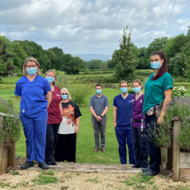Somerset animal hospital awarded for environmental impact

Pictured: The 'green team' at Cave.
A Somerset-based animal hospital has been recognised for its efforts to become a more environmentally friendly establishment.
Cave Veterinary Specialists, based in West Buckland, has been awarded silver status from Investors in the Environment (iiE), which runs the UK's environmental accreditation scheme.
EBVS and RCVS specialist in veterinary anaesthesia and analgesia, Will McFadzean, who oversees Cave's green project, commented on the accreditation: “As a practice, we take our environmental responsibilities extremely seriously so we’re delighted to have been awarded silver status by iiE.
“At Cave, we’ve put a detailed action plan in place to initiate change across the business to increase efficiency, reuse materials, embrace recyclable options and, in doing so, reduce waste. There’s now more, and larger, recycling bins around the practice and we’ve introduced blue recyclable hand towels to replace the white, non-recyclable ones.”
He continued: “All bottles used in our pharmacy are recyclable and all new syringes are made from recycled plastic in a carbon-neutral factory, where possible. We also have a paperless referral process and send certificates via email rather than on printed card, while our lab reports can now be accessed online.
“It extends right down to providing recyclable and biodegradable drinks cups and bamboo stirrers in reception. It’s a long and detailed list which illustrates just how determined we are to make a significant change in the way we work and reduce our impact on the environment.”
Cave has also made changes to its clinical settings, including switching to low flow anaesthesia and ending the using of nitrous oxide gas.
Other environmentally friendly changes to clinical settings that the hospital has made include the use of microfibre colour-coded cloths, which have been pre-soaked with vaporised peracetic acid to replace disposable wipes, and reducing the use of disposable theatre hats and aprons – opting for reusable versions where possible.



 The veterinary mental health charity Vetlife is inviting the veterinary community to join it for a sponsored cold-water dip.
The veterinary mental health charity Vetlife is inviting the veterinary community to join it for a sponsored cold-water dip.